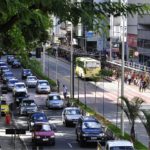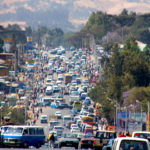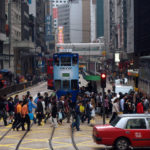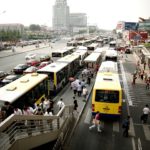Posts in the 'Road Safety' category
In 2003, London adopted a program of congestion pricing that now places a roughly $17 (£11.50) daily fee on motor vehicles entering central London. The effort was expected to reduce car traffic, air pollution, and emissions in the area, and ...

Walking and cycling may be the two most basic modes of transport, but they may also be the most promising for a sustainable future. In a car-filled world, it’s the people who use their own two feet or two wheels that ...

Two weeks ago, the World Bicycle Forum in Medellín, Colombia brought together more than 4,000 attendees from across the globe to discuss the challenges and opportunities of urban cycling. Many have praised the event for its ability to bring a ...

International Women’s Day is on March 8, 2015, and this year’s theme is “Make It Happen.” Nowhere do women make it happen more than they do in cities. In cities all around the world, women are working to improve the ...

Too many cities currently evaluate their streets in a way that doesn’t support long-term sustainability. The conventional approach centers exclusively on cars, and how quickly they can move up and down streets. Under this approach, a street receives an “A ...

For São Paulo, the largest city in the southern hemisphere, making sure that residents have access to reliable transport options at all hours of the day is a particularly acute issue given the size and population of the city. Starting ...

Last week, over 4,000 people gathered for the fourth World Bicycle Forum. This citizen-driven event was created by bike activists in Porto Alegre, Brazil after a car plowed through a group of bikers at a critical mass event in March ...

This article was originally published in The Indian Express. As Michael Bloomberg, former mayor of New York City, announces a package of assistance on road safety through Bloomberg Philanthropies’ Global Safety Initiative, here is an ugly truth: India has one ...

East Africa doesn’t make a lot of headlines for its sustainable transport achievements. That’s changing, as its cities are starting to pioneer innovative new projects to bring urban Africa into the spotlight for sustainable development. The challenges in the region ...

Yesterday, Bogotá, Colombia celebrated the 15th anniversary of its annual car-free day. Between 5am and 7:30pm, residents left their cars behind and turned to a variety of other modes of transport—a symbolic act that 63 percent of citizens institutionalized through ...

What will the city of the future look like? How can we unlock the potential of urbanization to create safe, accessible and prosperous societies? At Transforming Transportation 2015 – the annual conference co-organized by the World Resources Institute and the World Bank– we learned about ...

More than 1.2 million people worldwide are killed in road traffic crashes every year, and an additional 20 to 50 million are injured. According to the World Health Organization (WHO), if urgent action is not taken, these figures will increase ...

This article was originally published on January 15, 2015 by the Thomson Reuters Foundation. Last year marked an important tipping point: for the first time, half of the global population lives in cities. Cities currently add 1.4 million people each ...

Transforming Transportation (#TTDC15) is the annual conference co-organized by EMBARQ, the sustainable urban transport arm of the World Resources Institute’s (WRI) WRI Ross Center for Sustainable Cities, and the World Bank. This year’s conference focuses on Smart Cities for Shared Prosperity, and takes place on ...

Transforming Transportation (#TTDC15) is the annual conference co-organized by EMBARQ, the sustainable urban transport arm of the World Resources Institute’s (WRI) WRI Ross Center for Sustainable Cities, and the World Bank. This year’s conference focuses on Smart Cities for Shared Prosperity, and takes place on ...

Page 10 of 34« First...91011...2030...Last »
























